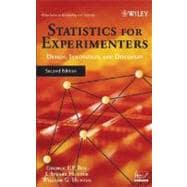
Note: Supplemental materials are not guaranteed with Rental or Used book purchases.
Purchase Benefits
What is included with this book?
J. STUART HUNTER, PhD, DSc, is Professor Emeritus of Civil Engineering at Princeton University. Dr. Hunter is a member of the National Academy of Engineering and has served as consultant to many industries and government agencies. He has been a staff member of the National Academy of Sciences, Committee on National Statistics; statistician in residence at the University of Wisconsin; and is the founding editor of Technometrics.
The late WILLIAM G. HUNTER, PhD, was Professor of Statistics and Engineering at the University of Wisconsin–Madison.
|
|||
|
|||
|
|||
|
|||
|
|||
|
|||
|
|||
|
|||
|
|||
|
|||
|
|||
|
|||
|
|||
|
|||
|
|||
|
|||
|
|||
The New copy of this book will include any supplemental materials advertised. Please check the title of the book to determine if it should include any access cards, study guides, lab manuals, CDs, etc.
The Used, Rental and eBook copies of this book are not guaranteed to include any supplemental materials. Typically, only the book itself is included. This is true even if the title states it includes any access cards, study guides, lab manuals, CDs, etc.